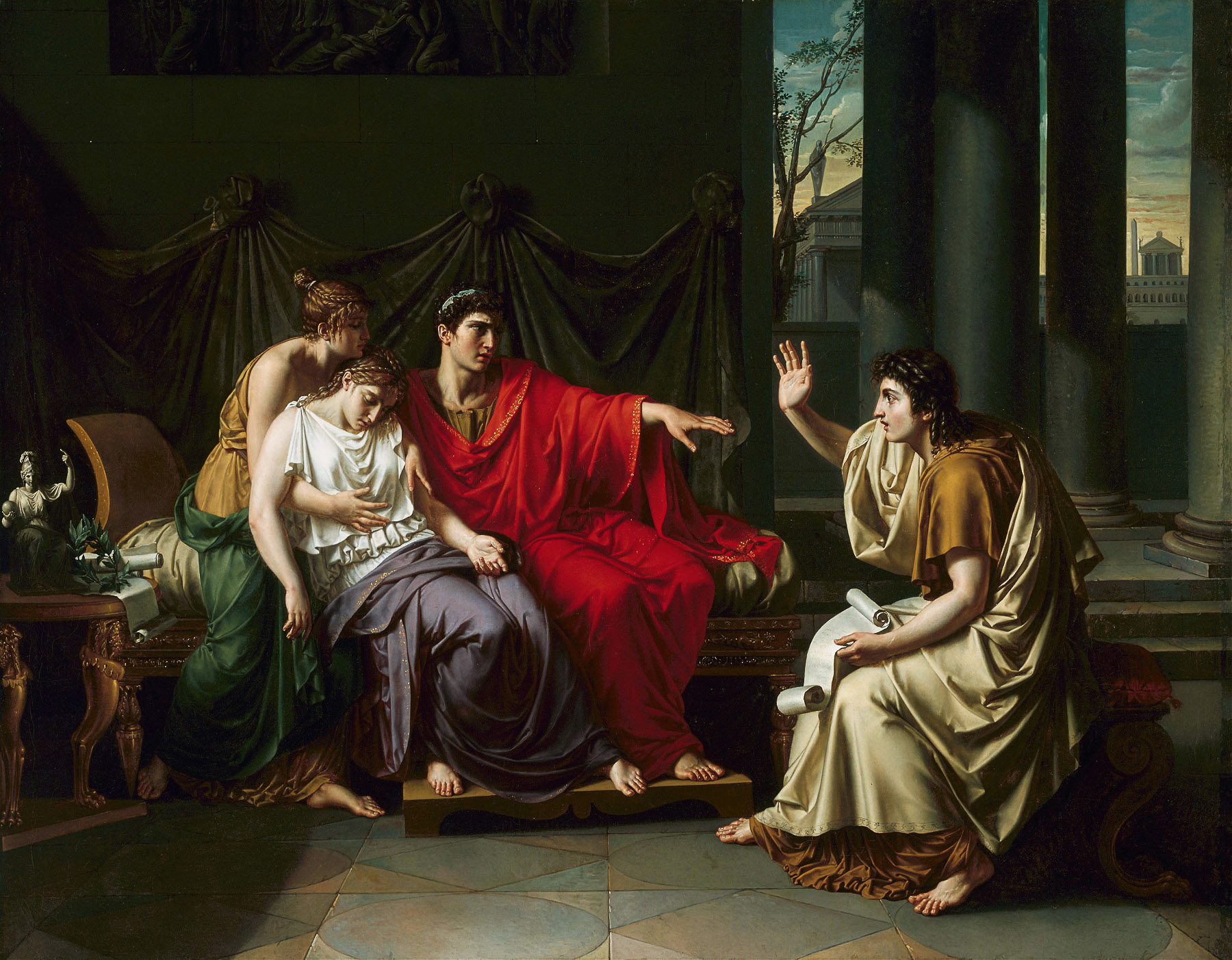Vergil &
the Chatbots
On Reading Latin
Versus Talking to A.I.


Dr. Anthony J. Fredette
The opposite of chatting with an A.I. ghost is reading literature written in Latin. If the truth of this claim is not immediately obvious, dear reader, allow me to explain. It has to do with the purposes for which human beings use language.
What is language for, anyway? It is often easy and sometimes useful to approach questions of definition apophatically, by saying what something is not. According to some of the architects of “generative artificial intelligence,” language is not meant to be distressing. Language is most often distressing when it is used by real people. The death or non-existence of real people who might otherwise have used language with us are acute sources of such distress. Generative A.I. can help. A.I. “girlfriends” have aroused quite a bit of media controversy, if nothing else. A.I. “grief bots” can generate A.I. “ghosts,” probability machines molded from text messages and emails written by a dead person; their raison d’être is to console the aggrieved by mimicking conversations that might have been had with the deceased were they still alive. Is this sort of thing really what language is for? “No,” you say, if you, thoughtful reader, are the sort of person I take you to be, “this use of language is revolting.” I agree wholeheartedly, but why do we feel this way? We must have some intuition about what language is for, and some part of us recognizes that generative A.I. usurps this purpose. Our aversion to chatbots (girlfriends and ghosts alike) tells us that language is not meant for having non-conversations with non-people about things that are not true.
 A via negativa thus leads to a positive definition of language’s purpose, one of two potentially controversial claims in this article: language is for expressing and receiving true ideas, and, since expression and reception require community, it is also for connecting real people. What revolts us conscientious, admittedly cantankerous, critics of corporate A.I. development is that chatbots fulfill neither of these functions. Because of their probabilistic design, they periodically “hallucinate,” and they make uncanny attempts to ape real human personalities. Think Gemini telling someone that eating a few rocks each day is considered a healthy dietary practice, because it was trained on, well, the internet, or remember Meta’s ill-fated and worse-received “chat with a celebrity’s alter-ego” feature. These products simply do not do what language is supposed to do. What the “grief bot” regurgitates into its text field is decidedly not Grandpa returned from the land of the dead, and “speaking” with it brings one no closer to the thoughts and personality of the real person.
A via negativa thus leads to a positive definition of language’s purpose, one of two potentially controversial claims in this article: language is for expressing and receiving true ideas, and, since expression and reception require community, it is also for connecting real people. What revolts us conscientious, admittedly cantankerous, critics of corporate A.I. development is that chatbots fulfill neither of these functions. Because of their probabilistic design, they periodically “hallucinate,” and they make uncanny attempts to ape real human personalities. Think Gemini telling someone that eating a few rocks each day is considered a healthy dietary practice, because it was trained on, well, the internet, or remember Meta’s ill-fated and worse-received “chat with a celebrity’s alter-ego” feature. These products simply do not do what language is supposed to do. What the “grief bot” regurgitates into its text field is decidedly not Grandpa returned from the land of the dead, and “speaking” with it brings one no closer to the thoughts and personality of the real person.
Allow me to develop this last example a bit further. Let us say, for the sake of the analogy, that the real Grandpa was your Grandpa — your Grand-Père in fact, for we shall also say that he was French, that he never spoke or wrote in English. Authentic language exists on a continuum, its placement determined by the degree of its fulfillment of the truth and human-connection functions of language in general. An authentic use of language, ordered toward achieving legitimate human connection, might be poring over the last letter your grandfather sent before his death, savoring not only the words contained therein but also the familiar voice of the man who used them (but only if you can read French). Less authentic than the letter would be Aunt Sally’s recollection of it. Such a conversation contains truth about it, but not perfectly, because Aunt Sally’s memory is not infallible. It also enables a connection to your grandfather, but a derivative one, because it is filtered through her. Still less authentic would be the results of Google Translate when provided the French text of the letter. It would produce something like the letter’s meaning, but only in the most literal, and certainly not in the truest, sense of that word. It would, to take but one example, silently make choices about which of several possible English synonyms of a French word should be included in its output. Moreover, none of Grandpa’s real, authorial voice would be retained. Least authentic of all would be the grief bot, which cannot in any way provide true communication with the person, even in the derivative forms of a translation or a relative’s memory. Such a contrivance is the precise antithesis of actual connection with the actual human being.

Such a contrivance is the precise antithesis of actual connection with the actual human being.

Of course this continuum of authentic language, previously applied to your grandfather, also applies to other uses of language. We sometimes want to express and receive the truth from real people who are dead, but more distantly related to us genetically, spatially, or temporally than our own grandfathers. We can achieve this sort of communication by reading great books. And if we apply our authentic language continuum to great books, the following analogies emerge. Reading Grandpa’s letter is like reading Seneca, Augustine, or Newton in his original language. Aunt Sally’s recollections are like a professor’s lecture, a textbook chapter, or, at best, a dynamic or poetic translation of them; even when wonderful to behold, they are not the genuine article. The results of the software-generated translation of the letter are like a rigidly and relentlessly literal translation of a classic. And the A.I. grief bot is something like a medium pretending to channel the spirit of Seneca for a student who fancies this an effective alternative to doing his homework.
Let us now turn to my second potentially controversial claim: the philosophical, religious, and otherwise literary traditions of Judeo-Christian and Greco-Roman civilization are the intellectual and spiritual progenitors of the best of our own culture, and therefore the sources of our great books. They should be dear to us, for they are the grandfathers of our cultural family. Some of them are French, many of them Greek, many more Latin. Reading an epistle from Seneca, the autobiography of St. Augustine, or a treatise by Newton is to the life of the mind what the letter from M. Grand-Père is to the life of the family. If you were given the opportunity to read it, and I mean really read it, without recourse to a summary, translation, or a relative’s recollections of it, why would you not? The point could be put more finely: would you rather be the person who insists on reading your grandfather’s letter yourself, or the person who, when given the opportunity to read it, instead asks Aunt Sally to give you the gist of it or perhaps just Googles Grandpa’s obituary?
To be fair to anyone who does not have an immediate and decisive answer to that question, let me complicate the picture once more. We have already agreed that your grandfather was French and that he never spoke or wrote in English; what if you could not read French? Surely, then, no one would blame you for wishing you could read his last letter, while thinking that the Sally summary or Google Translate might have to suffice. But what if you were a student in school who loved novels, and, instead of agonizing over whether filial piety demanded the slow acquisition of French, you consulted with Sally, who encouraged you to learn a new language. What if she told you that another school across town offered free introductory French lessons, that people all over the world gathered regularly to use the language and thus accelerate their acquisition of it, and that making the effort would allow you to read not only Grandpa’s letter, but also many of the best novels written during the past three hundred years? Why would you not make the attempt?
 Similar virtues and opportunities attend the study of the Latin language, but, in the latter case, Sally’s arguments become even more convincing. Classical charter schools that teach Latin as a matter of course and at no charge to students and their families are proliferating in this country. Online tutors and communities of Latin speakers have never been more prevalent. Finally, forget three hundred years: learning Latin gives one unmediated access to literature that spans at least nineteen hundred years by conservative accounts and includes what many would argue are the most important of European writings. If you set out to read Seneca, you can also discover Augustine. If you want to read Cicero, you can later delight in Erasmus. If you are inspired to read Boethius, you can be edified by Thomas Aquinas. If your heart longs to read Vergil, your soul can sing along with centuries of Christian hymns, many of which remain in active, liturgical use to this day. Unlike most languages in current use, and certainly unlike any other European language (pace Greek, but dialectical diversity at the beginning of its history and the Dimotiki-Katharevousa debate in modern times have no Latin parallel, at least after Charlemagne), Latin just is Latin, and it is fundamentally intelligible, whether a given author wrote in the first century B.C. or the fifteenth century A.D.
Similar virtues and opportunities attend the study of the Latin language, but, in the latter case, Sally’s arguments become even more convincing. Classical charter schools that teach Latin as a matter of course and at no charge to students and their families are proliferating in this country. Online tutors and communities of Latin speakers have never been more prevalent. Finally, forget three hundred years: learning Latin gives one unmediated access to literature that spans at least nineteen hundred years by conservative accounts and includes what many would argue are the most important of European writings. If you set out to read Seneca, you can also discover Augustine. If you want to read Cicero, you can later delight in Erasmus. If you are inspired to read Boethius, you can be edified by Thomas Aquinas. If your heart longs to read Vergil, your soul can sing along with centuries of Christian hymns, many of which remain in active, liturgical use to this day. Unlike most languages in current use, and certainly unlike any other European language (pace Greek, but dialectical diversity at the beginning of its history and the Dimotiki-Katharevousa debate in modern times have no Latin parallel, at least after Charlemagne), Latin just is Latin, and it is fundamentally intelligible, whether a given author wrote in the first century B.C. or the fifteenth century A.D.
Instead of intermediaries to true experience, someone who loves language, literature, and their best expressions rightly wants the most authentic version of them, for to possess the real thing is to possess both the truth and real human community. And if the dead are dear to us, and not only the living, then they deserve to be heard, and the human heart and mind yearn to hear them in their own voice. For translation is an art, and sometimes a necessary one, but never a properly liberal one; it is always subservient to what is really great, and it is never a perfect servant.
Allow me to illustrate this last point with a quotation from Vergil’s Aeneid. At its most literal level, the poem is about the journey of the survivors of the Trojan War to Italy, where they will become the progenitors of the world-defining Roman people. At the beginning of Book I, the leader of the survivors, the titular hero, Aeneas, is sailing through the Mediterranean Sea, when a jealous goddess stirs up a storm, which, as far as he knows, destroys his entire fleet, except for his own ship. The apparent survivors, much reduced in number, wash up on the northern shore of Africa. As the leader of the group, Aeneas has the unenviable task of encouraging his men, demoralized, exhausted, grieving, and fearful, to continue their journey in an unfamiliar land, in spite of the fact that almost everyone they know seems to be dead. Aeneas delivers one of the most famous speeches in the history of literature. Two of its verses run as follows:
O passi graviora, dabit deus his quoque finem.
(You who have suffered weightier misfortune, Zeus will give an end to these woes also.)
. . .
Durate, et vosmet rebus servate secundis.
(Endure, and preserve yourselves for more favorable times.)
In the first line, a literal English translation will significantly reduce the force of its hopeful tenor, since, in the Latin, the word translated as “end” comes literally at the end of the line.  In addition to its place being poetically appropriate, it is also the position of second-greatest emphasis in classical Latin syntax, emphasizing the finality of the end of the survivors’ woes. It is as if Vergil, through Aeneas, were saying, “no, next time, it will really be the end of your troubles.” In the second verse, the optimistic tenor of the literal English translation belies the sorrow of the speaker. Alliteration and consonance clash and combine to produce a sequence of hardly-interrupted sibilants that nearly devolve into hissing.
In addition to its place being poetically appropriate, it is also the position of second-greatest emphasis in classical Latin syntax, emphasizing the finality of the end of the survivors’ woes. It is as if Vergil, through Aeneas, were saying, “no, next time, it will really be the end of your troubles.” In the second verse, the optimistic tenor of the literal English translation belies the sorrow of the speaker. Alliteration and consonance clash and combine to produce a sequence of hardly-interrupted sibilants that nearly devolve into hissing.
It is as if Aeneas were pronouncing his message of hope and endurance while gritting his teeth, telling his men that, although they must press on, he is not insensitive to their suffering; in fact, he, too, is angry and aggrieved by their situation. Aeneas becomes, in the original Latin of the Aeneid, a sympathetic and sympathizing leader, and not merely a competent one. Only the sounds of the authentic text betray this characterization.

It is as if Aeneas were pronouncing his message of hope and endurance while gritting his teeth. . . . Aeneas becomes, in the original Latin of the Aeneid, a sympathetic and sympathizing leader, and not merely a competent one.

There simply is no substitute for Latin if one is interested in what the Aeneid really says, since what it says is in part an emergent property of how it is said. Reading the Aeneid in Latin is, in other words, practically the opposite of asking an A.I. chatbot about Vergil: the words of the former are true because they are a part of a reality directly experienced. They also represent a real human connection. Since these lines were composed by a real person, we commune with the thoughts and feelings of this person instead of someone’s translation and interpretation of them or — far worse— some AI’s impersonation of them.
Might such human connection sometimes cause distress? Of course. But just as the avoidance of distress is not the purpose of language, neither is it the purpose of life. And even if it were, the purveyors of bots have things backward: utilizing language properly for the transmission of truth and formation of human community will, in the end, lead to less personal and societal distress than the distress we already feel at the thought of communing with machines and the counterfeit dead.
I will close, patient reader, with an exhortation: grieve with Aeneas, grieve with Vergil, but do not grieve with a robot. Better yet: rejoice in your quintessentially human ability to use language, rejoice in community with other people, and rejoice in their ability to create true and beautiful things.


